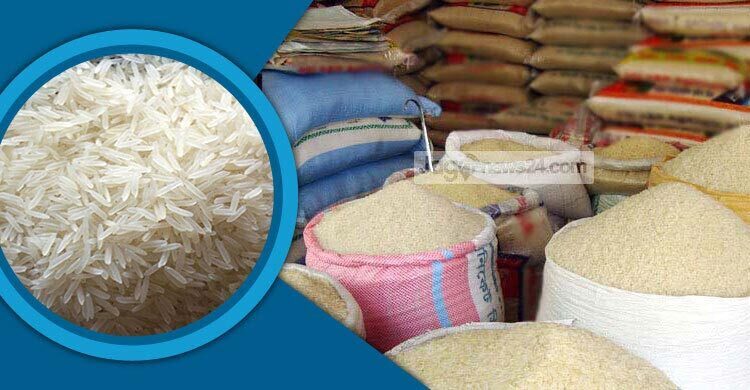Instability in the rice market, prices up by Tk 4-8 per kg

Despite the arrival of Boro season rice in the market and ongoing government collection efforts and availability of Aman season rice, the price of rice has surged by Tk 2 to Tk 400 per 50 kg bag in Chattogram’s wholesale market during the peak season.
This price hike comes amid adequate supply and no apparent production shortages anywhere the country.
Wholesale traders have complained that a few large industrial groups are manipulating rice prices by creating large stocks of rice at the miller level.
Millers, however, attribute the price increase to the recent floods in the Sylhet-Sunamganj region, which have disrupted the rice market.
The Consumers Association of Bangladesh (CAB), an organisation working on consumer rights, claims that a minister involved in the rice business is enabling syndicate traders to exploit the market. CAB also points to a lack of government oversight as a contributing factor to the price manipulation.
Wholesale traders' concerns
Wholesale traders allege that large industrial groups are manipulating rice prices by stockpiling at the miller level.
Omar Azam, General Secretary of the Chattogram Rice Traders Association, mentioned, "In previous years, the price of rice never increased during this peak season. In the last month, the price of a 50 kg rice bag has risen by Tk 250-300."
Azam added, "The price increase originates from northern region millers. Some large industrial groups have stockpiled significant quantities of paddy, manipulating prices at the miller level."
Price trends
Traders at Chaktai wholesale market reported that the price of coarse rice, such as Irri or Nurjahan Swarna, has increased by Tk 300-400 per 50 kg bag in a month, resulting in a Tk 6-8 per kg hike. This rise affects the poor and lower-middle-class consumers the most.
Jahedul Islam Shawon, a director at M/s Sekandar Hossain, said, "Today (July 15), a 50 kg sack of Noorjahan Swarna parboiled rice costs Tk 2,800, up from Tk 2,400 a month ago. Similarly, Irri unboiled rice has increased from Tk 2,000 to Tk 2,300 per 50 kg bag. The price of Beti-28 rice has gone from Tk 2,500 to Tk 2,900."
Kataribhog, a fine quality rice, is now being sold at Tk 3,600 which was Tk 3,300 a month ago.
Shawon said, "The price is being increased at the miller and Mokam level. Millions of tonnes of paddy have been stored in significant locations. These millers bought paddy at a low price at the beginning of the season by paying the farmers in advance. Now, as the market price of rice increases, the farmers are not benefiting. A few millers in Chattogram are buying rice at a low price from Mokam and then selling it to wholesalers at a high price."
Millers' perspective
Mohammad Rafiq, General Secretary of the Chattogam Rice Mill Owners Association, attributed the price rise to increased paddy costs. "The price of rice has risen by Tk 50-100 per 50 kg bag due to paddy prices increasing by Tk 40-50 per maund. Flood caused damages in the Sylhet-Sunamganj region has negatively impacted the rice market," he said.
Government and market oversight
The Consumer Association of Bangladesh (CAB) criticized the lack of government oversight. CAB's Central Vice President, SM Najer Hossain, remarked, "The market is controlled by traders, not the government. The food minister himself is a rice trader, which raises concerns about conflicts of interest."
He said, "Now is the peak season for rice. There is no shortfall in production or supply. Despite this, prices are rising. One reason is the lack of official market monitoring. It is reported that large companies have stored millions of tonnes of rice. There is no proper oversight from storage to wholesale distribution."
According to the Food Department, the government aims to collect 17 lakh tonnes of food grains during the current Boro season. This includes five lakh tonnes of paddy, 11 lakh tonnes of parboiled rice, one lakh tonnes of unboiled rice, and 50,000 tonnes of wheat. The collection prices are set at Tk 32 for Boro paddy, Tk 45 for parboiled rice, Tk 44 for unboiled rice, and Tk 34 for wheat.
As per the Food Planning and Distribution Unit (FPMU), by July 11, a total of 8,82,206 tonnes of rice had been collected across the country. This includes 1,70,645 tonnes of unhusked paddy, 7,14,005 tonnes of perboiled rice, and 57,282 tonnes of unboiled rice.
According to the Department of Food, as of July 14, the government food warehouses stored 15,95,590 tonnes of food grains. This stock includes 11,01,163 tonnes of rice and 1,38,810 tonnes of paddy.
MDIH/NMA



